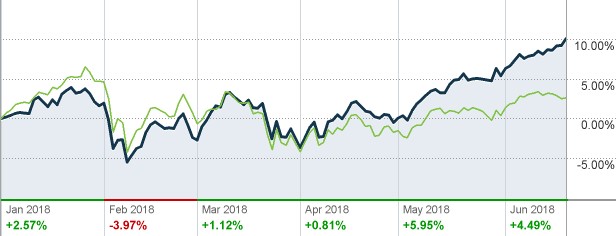Many investors have been largely focusing on large-cap stocks and commodities due to their impressive performance in recent times. But unbeknownst to them, they have been missing out on some huge small-cap opportunities.
Small-caps have been quietly outperforming in the background and taking out new highs thanks to Trump’s tax bonanza and regulatory reform.
Small company stocks as a group have comfortably outperformed their bigger brethren this year with the Russell 2000 Index flashing an 11.2 percent year-to-date return compared to just 3.5 percent by S&P 500 and a 0.25 drop by the Dow Jones Industrial Average (which consists of large industrial bellwethers).
Russell 2000 is now only a couple percentage points off its all-time high.
Russell 2000 Index vs. S&P 500 Index YTD Returns

Source: CNN Money
Small-Caps for Volatile Times
While large-caps are great for stabilizing a portfolio and for their juicy dividends, small-caps are like the Energizer Bunny, maintaining stamina when the economy slows down and the heavyweights start huffing and puffing.
And now JP Morgan is advising us to buy small-caps for something a bit different--as protection against trade wars.
The giant bank says these stocks are shielded from the escalating risk of trade wars and attendant dollar volatility which tend to ravage large companies. In fact, a good chunk of the small-cap rally this year has come courtesy of a flight to safety by investors who are wary about geopolitical concerns, tariff issues and trade war threats between the U.S. and its trading partners. Large-caps have much higher international exposure compared to small-caps, which are much more U.S.-centric.
JP Morgan’s piece of advice might sound a bit counterintuitive when you consider that the U.S. economy is expected to slow down from a 2.8 percent GDP growth in 2018 to just 2.0 percent in 2020. In fact, Boris Schlossberg, MD of foreign exchange strategy at BK Asset Management thinks that the small-cap frenzy is likely to be just a temporary thing.
Historical evidence, however, seems to be in JP Morgan’s favor.
The Russell 2000 has been leaving the S&P 500 in the dust over the past four decades during periods of economic turbulence, recessions and financial crises. It managed to outperform the large-stock benchmark by 80 percent in 1979-1983, 50 percent in 1990-1994 and 114 percent in 1994-2014. Related: 4 Reasons Why Gold Investors Should Keep A Cool Head
Large-caps, on the other hand, have gained the upper hand during periods of economic expansion, beating their lightweight peers in 1983-1990 (91 percent) and 1994-1999 (93 percent). Since early 2014, the U.S. economy has been on the ascendancy thus helping the S&P 500 beat the Russell 2000 once again.
Further in support of small-caps, their tendency to underperform during economic expansions is by no means set in stone. Small caps outperformed the broad-market by quite a wide margin during the 2003-2007 economic expansion, though admittedly it was shorter than previous expansion cycles.
Small-Cap ETFs
Other than trade wars, JP Morgan recommends buying small-caps as a catch-all trade for the current reflationary environment.
You can gain exposure to the small-cap sector by buying the iShares Russell 3000 ETF(IWM) - with a year-to-date return of 10.8 percent.
Some of its top holdings include online food ordering company GrubHub whose stock is up 59 percent; Aspen Technology (44.7 percent) and cancer diagnostics company Exact Science (31 percent).
By Alex Kimani for Safehaven.com
More Top Reads From Safehaven.com:
















